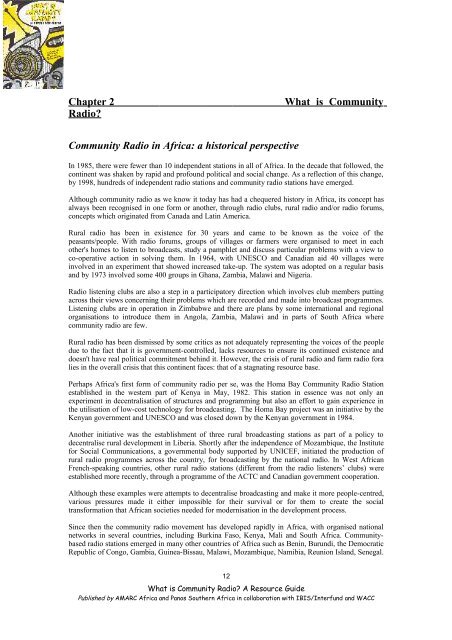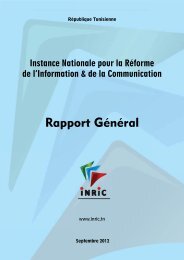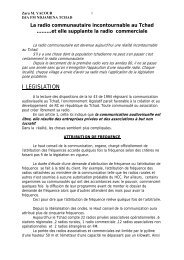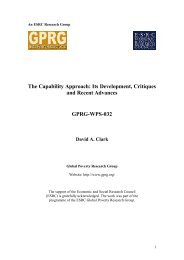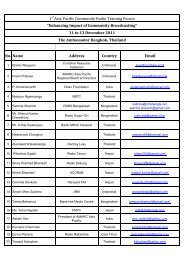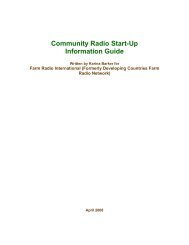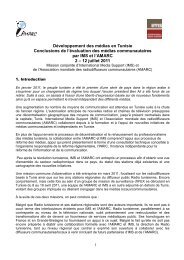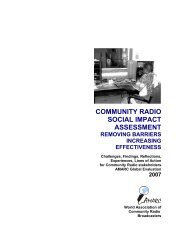WHAT IS COMMUNITY RADIO - amarc
WHAT IS COMMUNITY RADIO - amarc
WHAT IS COMMUNITY RADIO - amarc
Create successful ePaper yourself
Turn your PDF publications into a flip-book with our unique Google optimized e-Paper software.
Chapter 2<br />
Radio?<br />
Community Radio in Africa: a historical perspective<br />
What is Community<br />
In 1985, there were fewer than 10 independent stations in all of Africa. In the decade that followed, the<br />
continent was shaken by rapid and profound political and social change. As a reflection of this change,<br />
by 1998, hundreds of independent radio stations and community radio stations have emerged.<br />
Although community radio as we know it today has had a chequered history in Africa, its concept has<br />
always been recognised in one form or another, through radio clubs, rural radio and/or radio forums,<br />
concepts which originated from Canada and Latin America.<br />
Rural radio has been in existence for 30 years and came to be known as the voice of the<br />
peasants/people. With radio forums, groups of villages or farmers were organised to meet in each<br />
other's homes to listen to broadcasts, study a pamphlet and discuss particular problems with a view to<br />
co-operative action in solving them. In 1964, with UNESCO and Canadian aid 40 villages were<br />
involved in an experiment that showed increased take-up. The system was adopted on a regular basis<br />
and by 1973 involved some 400 groups in Ghana, Zambia, Malawi and Nigeria.<br />
Radio listening clubs are also a step in a participatory direction which involves club members putting<br />
across their views concerning their problems which are recorded and made into broadcast programmes.<br />
Listening clubs are in operation in Zimbabwe and there are plans by some international and regional<br />
organisations to introduce them in Angola, Zambia, Malawi and in parts of South Africa where<br />
community radio are few.<br />
Rural radio has been dismissed by some critics as not adequately representing the voices of the people<br />
due to the fact that it is government-controlled, lacks resources to ensure its continued existence and<br />
doesn't have real political commitment behind it. However, the crisis of rural radio and farm radio fora<br />
lies in the overall crisis that this continent faces: that of a stagnating resource base.<br />
Perhaps Africa's first form of community radio per se, was the Homa Bay Community Radio Station<br />
established in the western part of Kenya in May, 1982. This station in essence was not only an<br />
experiment in decentralisation of structures and programming but also an effort to gain experience in<br />
the utilisation of low-cost technology for broadcasting. The Homa Bay project was an initiative by the<br />
Kenyan government and UNESCO and was closed down by the Kenyan government in 1984.<br />
Another initiative was the establishment of three rural broadcasting stations as part of a policy to<br />
decentralise rural development in Liberia. Shortly after the independence of Mozambique, the Institute<br />
for Social Communications, a governmental body supported by UNICEF, initiated the production of<br />
rural radio programmes across the country, for broadcasting by the national radio. In West African<br />
French-speaking countries, other rural radio stations (different from the radio listeners’ clubs) were<br />
established more recently, through a programme of the ACTC and Canadian government cooperation.<br />
Although these examples were attempts to decentralise broadcasting and make it more people-centred,<br />
various pressures made it either impossible for their survival or for them to create the social<br />
transformation that African societies needed for modernisation in the development process.<br />
Since then the community radio movement has developed rapidly in Africa, with organised national<br />
networks in several countries, including Burkina Faso, Kenya, Mali and South Africa. Communitybased<br />
radio stations emerged in many other countries of Africa such as Benin, Burundi, the Democratic<br />
Republic of Congo, Gambia, Guinea-Bissau, Malawi, Mozambique, Namibia, Reunion Island, Senegal.<br />
12<br />
What is Community Radio? A Resource Guide<br />
Published by AMARC Africa and Panos Southern Africa in collaboration with IB<strong>IS</strong>/Interfund and WACC


